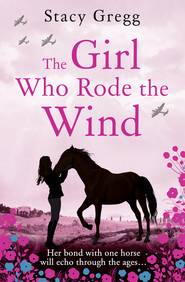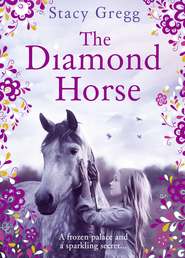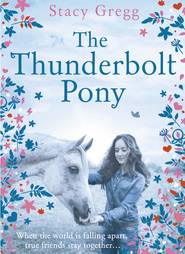По всем вопросам обращайтесь на: info@litportal.ru
(©) 2003-2024.
✖
The Fire Stallion
Автор
Год написания книги
2019
Настройки чтения
Размер шрифта
Высота строк
Поля
“Soon it will be the Jonsmessa – the apex of midsummer,” Gudrun said. “In ancient Iceland this was considered a most magical time. And so, to honour the ancients, we prepare for the ritual. We will bury this horn now and then, when the time is right, we will return.”
Gudrun produced a bundle of purple herbs and some yellow flowers, shoving half of them into the cow’s horn before turning to me. “May I have your necklace please?”
There was a silver chain around my neck that Mum had given me for my birthday. I hesitated. “My necklace? Why?”
Gudrun sighed. “The ritual requires something that has touched your flesh.”
I frowned. “Will I get it back again?”
“Yes, of course,” Gudrun said, as if she’d made this obvious already. “We will return for it.”
I took the necklace off and I was about to hand it to her but she shrank back. “No,” she instructed. “Not to me. You must put it in the horn.”
So I slipped the necklace inside, on top of the purple herbs, and then Gudrun took some more yellow flowers and pushed them into the horn too. Then she laid the horn carefully on its side in the hole I’d dug before patting the soil flat back over it.
She beckoned for me to stand up again. She stood beside me, her eyes closed and her hands raised above her head, and chanted a verse in a language I didn’t recognise. When she opened her eyes again she was smiling at me.
“All done,” she said brightly. “You can go home now, Hilly. Your mother will be wondering where you are.”
It was true. Mum was already waiting for me when I got back. When she asked where I had been, I knew it would wind her up if I mentioned Gudrun. Mum clearly found her annoying already. So I just said I’d gone for a look around while she finished her call.
In our cabin that night, I slept really well because I was so jetlagged. I didn’t notice that the night sky was as bright as day. When I woke up, the clock said it was morning, although time seemed meaningless by then. For a moment, I couldn’t work out how I’d even ended up here, and when I thought back to the whole episode in the Colosseum with Gudrun, it felt so surreal I could have sworn I’d imagined it. But then I put my hand to my neck and realised, with a shiver, that my silver chain was gone.
(#u0601c84a-2698-5d26-ac1a-7704b4f3ebed)
We were having breakfast in the hotel restaurant the next morning when Gudrun swept in, red curls flying out behind her in a fiery blaze.
“I’ve just read the new script.” She flung the thick wodge of paper down in front of me and it hit the table with a dull thud.
“Is it any good?” I asked.
“Aargh.” Gudrun pulled a face. “If you like fairy tales, it’s excellent. But I’m not interested in fairy tales. It’s the truth that I want to see. The real Brunhilda, a ferocious warrior who takes the throne after her father and leads her tribe to be Queen of Iceland.”
I must have looked doubtful because Gudrun picked up on my hesitation.
“Isn’t this what you want too, Hilly?”
“Yes, I guess,” I said, “if that’s the truth, but what I want doesn’t necessarily count around here.”
Gudrun’s eyes narrowed. “But what do you think?”
I sat there for a moment, gathering my thoughts so that I would say this right. “Why is it that in all the movies I see the Vikings are men? I’ve never seen a girl Viking. Maybe the girls really did just cook and clean and the boys were the only ones who got to do all the cool stuff like swordfights and horse riding.”
“You see history as it’s told by men,” Gudrun said. “And these men know nothing because they weren’t there.”
“I guess so,” I replied, “but you weren’t there either. The only person who really knows what happened to her is Brunhilda.”
I thought Gudrun would be cross with me for saying this. But she looked delighted and threw her arms around me.
“Exactly! Oh, I knew I was right to choose you!” She gave me a kiss on the forehead.
I wasn’t sure exactly what she was going on about, but I smiled anyway.
“Two weeks from tonight, Jonsmessa will be here at last,” she went on. “Then, Hilly, we’ll find out everything we need to know.”
There was even more bounce than usual to her step as she headed back out the door, dashing past Mum, who was heading to our table from the breakfast buffet with a plate of bacon and eggs for us both.
“What’s up with Gudrun?” she asked.
“What do you mean?” My heart was racing.
“She came in and left again without eating anything.” Mum shook her head. “That woman is very peculiar.”
“Yes,” I agreed, “she most certainly is.”
In the weeks of pre-production that followed, Gudrun didn’t mention Jonsmessa again to me. She was still pretty friendly, but her focus seemed to be on Katherine and the script and getting it right. They would frequently sit at a table in the dining room locked in heated discussions. Sometimes I would see Gudrun by herself at the same table late into the evenings as she cast her runes and chanted. One morning at breakfast, before we ate she’d insisted the room needed “cleansing” and we had to wait to eat until she could perform her ritual: waving a burning bunch of sage. Considering the frequent strangeness of her behaviour, being dragged along to bury a cow’s horn didn’t seem so out of the ordinary when I thought about it now. In fact, it had pretty much become a distant memory. Also, I had something else to distract me from the cultural consultant’s enchantments. I had somehow landed myself a job.
It had happened the same morning that Gudrun had cleansed the room at breakfast. Mum was sorting out the room in the hotel that she’d been allocated for costume storage. Mum’s assistant had gone back to London for more items and was due to return that afternoon, and they were on the phone to each other talking about how many racks they needed when there was a knock at the door. I opened it to find a woman with sandy blonde hair tied back in a messy plait. She was wearing jodhpurs and riding boots.
“I’m Niamh,” she said. “I’m from the equine department. I’m afraid we have a problem.”
“What kind of a problem?” Mum asked.
Niamh pulled a face. “It’s easier if I show you … Let’s go to the stables.”
The stables turned out to be a low block of buildings, just a short walk from the hotel, down by the river. I was shocked at the enormity of the scale of them. There were so many rows of loose boxes! And there was an indoor training ménage with a round pen and a sawdust schooling arena too.
“It’s so lucky they had these facilities here for your horses,” I said as Niamh slid back the barn doors.
“Oh no,” she laughed. “None of this existed before. They custom-built it for us so that it was ready when we got here. The weather was so cold and wet when we arrived. It was the middle of winter – minus fifteen degrees and pitch black outside most days. We were getting up in the dark and working all day in the dark – our lives had almost no daylight for months really. The weather back home in Ireland isn’t great but at least there’s sun! So naturally under those conditions we were really looking forward to summer. We didn’t think about the major problem it would cause.”
“What problem?” Mum asked.
“I’ll show you,” Niamh said.
We walked up the central corridor of the stable block and Niamh went up to the loose box that was labelled in gold with the name OLAFUR.
“This is Olafur, but we call him Ollie.” Niamh opened the top half of the Dutch door. There was a horse inside, standing in the middle of the loose box. He had the look of a prize fighter, stocky and burly, yet he was no more than fifteen hands high. His eyes, which were half-closed as if he had been dozing, were almost completely covered by an enormous bushy forelock. It looked like he had a massive fringe, this giant explosion of sunburnt brown hair that sprang out from between his ears and then crested his powerful neck. His tail was bushy and enormous too, and had the same bedraggled sunburnt colour against his coat, which was quite sleek and almost black.
“What breed is he?” I asked.
“He’s an Icelandic,” Niamh said. “They all are. Connor, that’s my brother, he and I wanted to bring our own stunt horses with us from Ireland, but the rules are strict and it’s impossible to bring any horses in.”
“Why?”
“It’s been the law for centuries now.” Niamh shook her head in wonder. “They’re really serious about keeping the bloodlines of their horses pure. And if you take an Icelandic horse out of the country, even for a single day to compete or for work, that’s the end of it. They’re not allowed to return again. Ever.”
“Really?”











